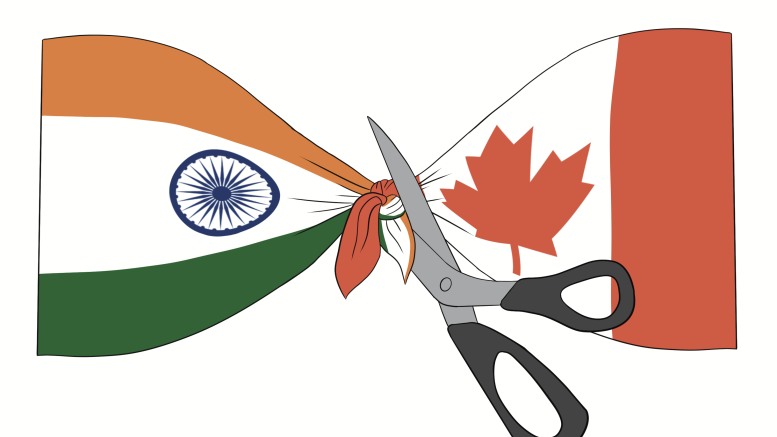Since the assassination of Hardeep Singh Nijjar in 2023, the deterioration of relations between Canada and India has sparked shock, anger and above all, confusion among many Canadians and Indians alike. The situation has developed rapidly, stoking strong emotions across the globe.
Within Canada, many are quick to take rigid, accusatory positions, eager to push potentially harmful narratives onto South Asian communities caught in the clash. Misinformation, racism and Canada’s own mismanagement of pivotal issues have all contributed to a hailstorm of issues for Canada’s South Asian population.
On June 18, 2023, Canadian Nijjar was assassinated in British Columbia by three men. The RCMP suspected that the three men are connected to the Indian government. The men have been charged but further investigations into additional suspects are still being made. Nijjar was a Canadian Sikh leader who was designated a terrorist by India for his alleged links to the Khalistan Tiger Force, a banned militant group in India.
Regardless of the accusations made by the Indian government, Nijjar was a Canadian citizen who officials believe was murdered by a foreign government from within Canada. If proven true, this is an unacceptable development and a blatant violation of Canadian sovereignty. This issue has led to a rapid deterioration of relations between the two countries, showing no signs of improvement in the foreseeable future.
Canada and India, despite being on opposite ends of the globe, have a deeply historical and important relationship that has endured for over a century. Apart from sharing a legacy of British rule, since the 19th century, India and Canada have established diplomatic relations. Many Indian immigrants have come to Canada since the late 19th century but this is the first time Canada’s relationship with India, the world’s largest democracy, has deteriorated to such a degree. If relations continue to plunge, the ramifications could be devastating for the South Asian population in Canada.
The clash between India and Canada comes at a terrible time. Already across Canada, South Asian Canadians have faced heightened challenges, as misguided Canadians blame immigration and housing policy failures on recent immigrants who are facing the same challenges. Many across Canada note their worry that this deterioration of relations will affect their work or study in Canada and additionally spur community tensions to an even greater degree.
International students bear the brunt of these developments, and the answer remains to be seen to what degree tensions could further affect life in Canada. Applications to come to Canada to study have already dropped by four per cent from India in 2024. It is therefore paramount to be knowledgeable of what further effects this could have on students as Canada’s own policy failures have already led to a crisis in many areas of daily life.
Recently, Canada’s welcoming image is dimming as it becomes increasingly inhospitable to international students. International tensions only stoke these flames, making studying in Canada more challenging. The government’s approach to many issues being faced in Canada has been reckless and left Canadians, immigrants and international students behind. Major policy failures led to a plethora of issues impacting students majorly, from out-of-control housing rates, hiring shortages, workplace exploitation and racist attitudes. The situation between Canada and India only amplifies these already prevalent issues.
Nearly 37 per cent of international students who were granted study permits to come to Canada in 2024 are from India. At the U of M, where just over 22.7 per cent of our students are international, issues affecting the community are massively important to the university.
It is easy for Canadians to forget the issues being faced by immigrants and international students — especially when facing the same issues themselves, but this is a crisis affecting nearly every aspect of Canadian life. Forgetting an entire sector of the population, or worse, blaming them for the problems only entrenches us within a broken situation. Finding solutions will require the collective effort of all.
Canada, in response to these issues, has amended the post graduate work permit (PGWP) rules to terminate student visas upon graduation. International students, primarily from India, across Canada have protested this amendment. Still, the Canadian government is unlikely to budge on this amendment. None of this is helped by the deterioration of international relations, as South Asian international students are misconstrued as the symbol of Canada’s policy failure and receive the greatest consequences as a result.
Racism against South Asians in Canada has spiralled out of control. These attitudes are not constrained to social media. Racially motivated attacks on South Asians have increased massively across the country. According to Statistics Canada, the number of hate crimes targeting South Asians increased by 143 per cent from 2019 to 2022. This number is shocking and reveals the already turbulent nature of the situation and the potential for further violence if the issue of the South Asian community is not addressed.
As South Asian immigration and especially relations with India become focal points of the Canadian political subconscious, it is paramount to recognize these issues facing a major portion of the Canadian population. It is especially important for domestic students and international students in general to recognize their responsibility to be aware of these issues, because misinformation permeates throughout the Canadian media landscape.
Lastly, it is important to not forget that it is our collective recognition of universal issues that will be invaluable in supporting each other and taking action.


